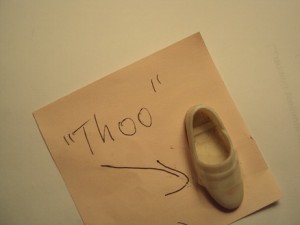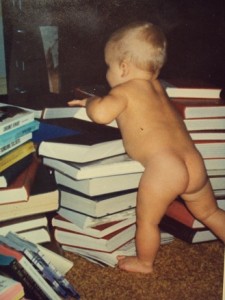Nate has been gone a little more than two years now. Yesterday I found a stack of pictures I’d tucked into an upstairs drawer, photos I hadn’t seen in over a year. He was in every one of them. The value of these images has skyrocketed, because we can never make more.
I love looking at pictures of Nate, staring into his face, thinking about him. For a split second, he’s back.
Last week I came across one of the weekly index cards he wrote for each of our away-from -home kids every Sunday. As always, it was covered with his difficult-to-read handwriting, sharing family news. I read it three times, studying his words and especially his signature, “Love, Papa.”
Today I had a third split second visit from Nate in the most unlikely place: our basement freezer. I was digging around for a bag of pecans I knew were in there someplace, holding frozen packages of meat, veggies, and chocolate chips in my arms, when a pale pink Post-it fell to the floor. It had a tiny white shoe taped to it with the word “Thoo” and an arrow pointing to it.
When our toddlers were learning to talk, Nate had always been fascinated with their mispronounced words. He loved language and read dictionaries for pleasure, but no words fascinated him more than the ones his kids created. He found particular delight in using their nonsensical vocabulary in his own conversations, words like “chach” for lunch, “setsup” for catsup, and “eltenoh” for elephant.
As for the pink Post-it, one of our 18 month old girls had first called her shoe a “thoo,” and Nate found that charming. He began using it to refer to his own “thoo’s,” and years later, when Barbie-doll and her beau Ken-doll joined our family, he laughed and laughed over their tiny shoes. Long after the girls had left dolls behind, we gave away our accumulated Barbies, Kens and their dilapidated wardrobes, including enough shoes to impress Imelda Marcos.
Then, as we were packing to move two years ago, one of Ken-doll’s miniature white bucks appeared under a bookshelf, its mate long gone. Nate didn’t just enjoy a private chuckle and sweep it into the dust pan. He put it in his pocket instead and made a plan. Eventually, the “thoo” silently appeared on my dresser, a tiny inside joke between a husband and wife.
How that piece of paper got into the freezer I’ll never know, but I have a hunch. Our God cares about the little things and loves to surprise us. He knew I’d get a little jolt of joy today from that tiny shoe and so arranged for it to walk back into my life via the freezer…
…a thoughtful God reminding me of a thoughtful man.
“Love never fails.” (1 Corinthians 13:8a)




